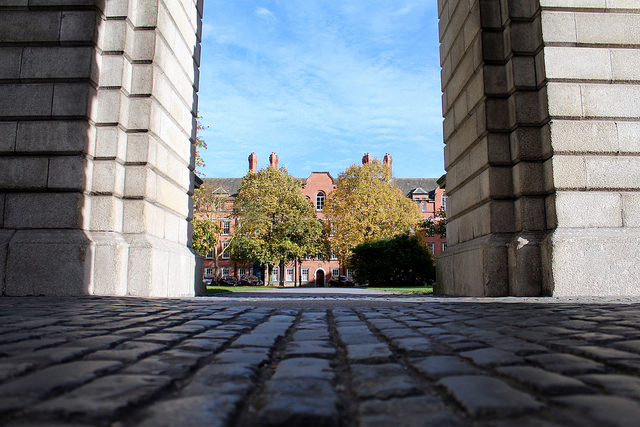Increased efforts to attract Northern Irish students have resulted in a 23 per cent increase in applications for 2016 but, with only 78 of these students accepting a place, a nearly 30 per cent decrease in acceptances from 2015.
The number of students applying to Trinity through the CAO and Trinity’s Northern Ireland Feasibility Study increased from 745 in 2015 to 928 this year, a reflection of the College’s ongoing efforts to attract these students.
Despite the increase in applications, the number of offers to Northern Irish students remained the same as in 2015 at 244.
Trinity has made considerable efforts in recent years to attract students from Northern Ireland, including the launch of Trinity’s Northern Ireland Engagement Programme in 2013, which focuses on the promotion of Trinity at career fairs as well as in schools throughout Northern Ireland. The programme also aims to improve the overall college experience of Northern Irish students once they arrive in Dublin.
Trinity also provides an outreach system for Northern Irish students and graduates, most notably through their Student Ambassador System and their Northern Irish Alumni Association.
The Trinity Feasibility Study for Northern Ireland, which aims to help in the areas of grade conversion and admission mechanisms, was launched in July 2014 in response to the decline in the number of applicants from Northern Ireland.
This accompanied the new A-Levels/CAO conversion system that aimed to allow Northern Irish students to access some of the higher-points courses on offer in the College, including history, law and maths. An A* would now be worth 180 points, a move that aided many of those who chose to study three subjects for A-Level.
Speaking at a meeting of University Council on September 28th, the Senior Lecturer and Dean of Undergraduate Studies, Dr Gillian Martin, committed to investigating the reasons for the drop in acceptances.
Various reasons, including Brexit, were put forward as possible reasons for the drop, but it was noted that this could not be confirmed without an analysis of figures from across the UK.
Provost Patrick Prendergast noted at University Council that there has been no communication from the government in relation to fees for Northern Irish Students, considering that Brexit means they will be non-EU students under the current rules.
In an email to The University Times, Dr Seán O’Reilly, Trinity’s Student Recruitment Officer, hailed the increase in applications as “testament to the hard work Trinity has been doing for a number of years now”.
According to O’Reilly, it also comes as a reaffirmation of Trinity’s “ambition to be a university for the whole island of Ireland”. O’Reilly also addressed the decline in acceptances in referencing Brexit: “While the [Irish University Association] (including Trinity) has made a commitment to 2016 entrants to maintain their EU fee status for the duration of their degree, there are big questions that are very hard to answer right now.”
In addition, O’Reilly spoke of a number of other factors that may be contributing to this fall in acceptances in proportion to the overall applications made. He cited the conditional offer system in place under the Ucas programme, the application system used in the UK: “The UK universities bombard you with promotional material, three to four months before you even get an offer from Trinity.”
O’Reilly drew attention to the “confusion, uncertainty and outright game-changing nature of Brexit”, something that has “undoubtedly impacted” the decisions of Northern Irish students. O’Reilly also expressed concern about the ongoing accommodation crisis in the city, something “problematic” for many students from Northern Ireland who might consider studying in Trinity.
O’Reilly reaffirmed Trinity’s commitment to attracting a greater number of Northern Irish students and ensuring “that an outcome that is in the best interests of our current and indeed future [Northern Irish] students is secured”. He drew attention to Prendergast’s commitment to see 300 Northern Irish students enter the College annually in coming years.
Martin did not respond to a request for comment.
With a total of 7,965 first preference applications, this year, Trinity reversed the trend that had seen it become one of only two universities in Ireland to see a consistent decrease in first-preference applications between 2012 and 2014. The overall number of applications to Trinity decreased slightly: 18,551 in 2016 compared to 18,914 in 2015.
Twenty-one per cent of Trinity’s new applicants were admitted through schemes including the Mature Student Dispensation Scheme and the Trinity Access Programme (TAP) foundation courses.







